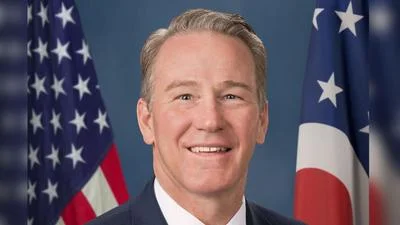U.S. Sen. Sherrod Brown (D-OH), Chairman of the U.S. Senate Committee on Banking, Housing, and Urban Affairs, sent a letter to Federal Reserve Chair Pro Tempore Jay Powell and Acting Comptroller of the Currency Michael Hsu urging them to join the Federal Deposit Insurance Corporation (FDIC) in ensuring that bank mergers, if approved, serve American families, small businesses, and communities – not Wall Street and big corporations.
“Enabled by rubber-stamp merger oversight, the biggest banks have only grown bigger and consolidated their dominance—the last few years have made this trend obvious. This consolidation has enriched big bank shareholders and executives, buoyed by record bank profits. But their gains have come at the expense of consumers and small businesses with less access to low-cost financial services. The data is clear about the serious, wide-ranging harms that bank mergers impose on communities,” warned Sen. Brown.
He wrote, “I urge you to initiate a public comment process on bank merger review, like the FDIC’s, and to work with DOJ to ensure that we have a fair and competitive financial system. In light for the growing concern of how concentration hinders free markets, a public comment process would allow Americans to share how mergers have affected their communities and allow the agencies to reconsider their approval frameworks to better focus on small businesses, consumers and families, as Congress intended.”
A copy of the letter is available here and below.
Dear Chair Pro Tempore Powell and Acting Comptroller Hsu:
To protect consumers, small businesses and their communities, I urge the Fed and OCC to join the FDIC and review and reconsider their approach to big bank mergers. The federal banking agencies must all adopt a posture toward bank merger reviews that prioritizes competition, financial stability, and the needs of working families and small businesses.
Our markets have grown increasingly concentrated. In three-out-of-four industries, consolidation has grown since the 1990s, driving up prices for consumers and undercutting worker bargaining power. Concentration has undercut family farms which due to declining competition face a no-win scenario where they pay ever rising prices for inputs, like seed and fertilizers, but must accept take-it-or-leave-it prices when their livestock goes to market.
To confront concentration, agencies across the federal government have pushed to tighten competition policy. The Justice Department and Federal Trade Commission have opened their merger guidelines for revision. The Department of Agriculture has pushed to fight consolidation and unfair trade practices in poultry, hog, and cattle markets. And President Biden has spearheaded a whole-of-government initiative to promote competition through his executive order on competition last July.
The banking system has witnessed the same steep and worrying drop in competition as has other industries. Enabled by rubber-stamp merger oversight, the biggest banks have only grown bigger and consolidated their dominance—the last few years have made this trend obvious. This consolidation has enriched big bank shareholders and executives, buoyed by record bank profits. But their gains have come at the expense of consumers and small businesses with less access to low-cost financial services. The data is clear about the serious, wide-ranging harms that bank mergers impose on communities.
At its core, consolidation hurts consumers. In the aftermath of a merger, the rates banks pay depositors go down, while the rates and fees banks charge borrowers go up. Bank branches invariably close, making it harder for consumers to access financial services in their neighborhoods. Troublingly, branch closures are usually clustered in low- and moderate-income communities. That’s why these closures often push consumers out of the banking system and, toward high-fee, predatory non-bank financial companies—like check cashers and payday lenders—that appear where branches used to be. In fact, households in communities affected by bank mergers are more likely to see debts sent to collections agencies, or to become evicted.
Consolidation also harms small businesses. Study after study has documented how, following bank mergers, small business lending dries up and available loans become more expensive. It’s little wonder that small business formation subsequently suffers. Consolidation among banks also supports consolidation in non-financial industries, undermining small enterprises. Meanwhile, community banks that serve rural and smaller communities and support more small business lending than Wall Street banks are forced to compete on an uneven playing field with nonbank fintech companies.
Finally, mega mergers jeopardize financial stability by creating new “too big to fail” institutions. A wealth of data and evidence supports the commonsense point that larger banks pose greater systemic risks. The Federal Reserve found that the failure of a single large bank has a greater negative impact on the economy than the failures of multiple banks that are together the size of the large bank.
We need a more energetic, more vigilant framework for bank merger review—one that reflects today’s banking landscape and understands how market concentration undermines competition. This framework would enable regulators to carefully scrutinize a merger’s impact on our economy and the communities served. Under the Bank Merger Act, Congress requires regulators to consider whether a transaction could leave consumers and small businesses outside the banking system—without a convenient bank branch or accessible financial services. But too often, the banking agencies have brushed this requirement aside, allowing for an unchecked run of megabank deals. Regulators last denied a bank merger application in 2003. It is time for regulators to transform their approach to better protect the consumers and small businesses that bank mergers leave behind.
I applaud the efforts of the FDIC Board to seek comment on the effectiveness of its bank merger framework. I am also encouraged by the Justice Department’s recent request for public comment on how it might revise its Bank Merger Competitive Review Guidelines.
The Fed and OCC must follow their lead. I urge you to initiate a public comment process on bank merger review, like the FDIC’s, and to work with DOJ to ensure that we have a fair and competitive financial system. In light for the growing concern of how concentration hinders free markets, a public comment process would allow Americans to share how mergers have affected their communities and allow the agencies to reconsider their approval frameworks to better focus on small businesses, consumers and families, as Congress intended.
I am hopeful that your agencies can join in on a new approach to bank merger review that supports economic prosperity for all communities.






 Alerts Sign-up
Alerts Sign-up